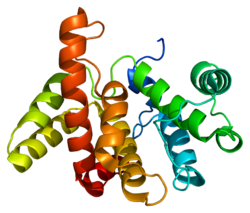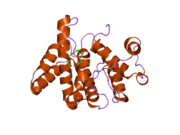RACGAP1
Rac GTPase-activating protein 1 is an enzyme that in humans is encoded by the RACGAP1 gene.[5]
Function
[edit]Rho GTPases control a variety of cellular processes. There are 3 subtypes of Rho GTPases in the Ras superfamily of small G proteins: RHO (see MIM 165370), RAC (see RAC1; MIM 602048), and CDC42 (MIM 116952). GTPase-activating proteins (GAPs) bind activated forms of Rho GTPases and stimulate GTP hydrolysis. Through this catalytic function, Rho GAPs negatively regulate Rho-mediated signals. GAPs may also serve as effector molecules and play a role in signaling downstream of Rho and other Ras-like GTPases.[supplied by OMIM].[6] Over-expression of RACGAP1 is observed in multiple human cancers including breast cancer,[7] gastric cancer[8] and colorectal cancer.[9] Evidence show that RACGAP1 can modulate mitochondrial quality control by stimulating mitopahy and mitochondrial biogenesis in breast cancer.[10][11] Knocking out RACGAP1 in vitro using CRISPR/Cas9 leads to cytokinesis failure.[12]
Interactions
[edit]RACGAP1 has been shown to interact with ECT2,[13] Rnd2[14] and SLC26A8.[15]
During cytokinesis, RACGAP1 has been shown to interact with KIF23 to form the centralspindlin complex.[16] This complex is essential for the formation of the central spindle. RACGAP1 also interacts with PRC1 to stabilize and maintain the central spindle as anaphase proceeds.[17] RACGAP1 can also interact with ECT2 during anaphase of cytokinesis, loss of RACGAP1 leads to cytokinesis failure.[18]
References
[edit]- ^ a b c GRCh38: Ensembl release 89: ENSG00000161800 – Ensembl, May 2017
- ^ a b c GRCm38: Ensembl release 89: ENSMUSG00000023015 – Ensembl, May 2017
- ^ "Human PubMed Reference:". National Center for Biotechnology Information, U.S. National Library of Medicine.
- ^ "Mouse PubMed Reference:". National Center for Biotechnology Information, U.S. National Library of Medicine.
- ^ Touré A, Dorseuil O, Morin L, et al. (March 1998). "MgcRacGAP, a new human GTPase-activating protein for Rac and Cdc42 similar to Drosophila rotundRacGAP gene product, is expressed in male germ cells". The Journal of Biological Chemistry. 273 (11): 6019–23. doi:10.1074/jbc.273.11.6019. PMID 9497316.
- ^ "Entrez Gene: RACGAP1 Rac GTPase activating protein 1".
- ^ Ren K, Zhou D, Wang M, et al. (March 2021). "RACGAP1 modulates ECT2-Dependent mitochondrial quality control to drive breast cancer metastasis". Experimental Cell Research. 400 (1): 112493. doi:10.1016/j.yexcr.2021.112493. PMID 33485843. S2CID 231701513.
- ^ Saigusa S, Tanaka K, Mohri Y, et al. (January 2015). "Clinical significance of RacGAP1 expression at the invasive front of gastric cancer". Gastric Cancer. 18 (1): 84–92. doi:10.1007/s10120-014-0355-1. PMID 24615626. S2CID 13008506.
- ^ Imaoka H, Toiyama Y, Saigusa S, et al. (March 2015). "RacGAP1 expression, increasing tumor malignant potential, as a predictive biomarker for lymph node metastasis and poor prognosis in colorectal cancer". Carcinogenesis. 36 (3): 346–54. doi:10.1093/carcin/bgu327. PMID 25568185.
- ^ Ren K, Zhou D, Wang M, et al. (March 2021). "RACGAP1 modulates ECT2-Dependent mitochondrial quality control to drive breast cancer metastasis". Experimental Cell Research. 400 (1): 112493. doi:10.1016/j.yexcr.2021.112493. PMID 33485843. S2CID 231701513.
- ^ Zhou D, Ren K, Wang M, et al. (February 2021). "Long non-coding RNA RACGAP1P promotes breast cancer invasion and metastasis via miR-345-5p/RACGAP1-mediated mitochondrial fission". Molecular Oncology. 15 (2): 543–559. doi:10.1002/1878-0261.12866. ISSN 1574-7891. PMC 7858103. PMID 33252198.
- ^ Ren K, Zhou D, Wang M, et al. (2021-03-01). "RACGAP1 modulates ECT2-Dependent mitochondrial quality control to drive breast cancer metastasis". Experimental Cell Research. 400 (1): 112493. doi:10.1016/j.yexcr.2021.112493. ISSN 0014-4827. PMID 33485843. S2CID 231701513.
- ^ Ren K, Zhou D, Wang M, et al. (March 2021). "RACGAP1 modulates ECT2-Dependent mitochondrial quality control to drive breast cancer metastasis". Experimental Cell Research. 400 (1): 112493. doi:10.1016/j.yexcr.2021.112493. PMID 33485843. S2CID 231701513.
- ^ Naud N, Touré A, Liu J, et al. (May 2003). "Rho family GTPase Rnd2 interacts and co-localizes with MgcRacGAP in male germ cells". The Biochemical Journal. 372 (Pt 1): 105–112. doi:10.1042/BJ20021652. PMC 1223378. PMID 12590651.
- ^ Toure A, Morin L, Pineau C, et al. (June 2001). "Tat1, a novel sulfate transporter specifically expressed in human male germ cells and potentially linked to rhogtpase signaling". The Journal of Biological Chemistry. 276 (23): 20309–20315. doi:10.1074/jbc.M011740200. PMID 11278976.
- ^ Glotzer M (February 2013). "Cytokinesis: centralspindlin moonlights as a membrane anchor". Current Biology. 23 (4): R145-7. Bibcode:2013CBio...23.R145G. doi:10.1016/j.cub.2013.01.006. PMID 23428321.
- ^ Lee KY, Esmaeili B, Zealley B, et al. (June 2015). "Direct interaction between centralspindlin and PRC1 reinforces mechanical resilience of the central spindle". Nature Communications. 6: 7290. Bibcode:2015NatCo...6.7290L. doi:10.1038/ncomms8290. PMC 4557309. PMID 26088160.
- ^ Ren K, Zhou D, Wang M, et al. (March 2021). "RACGAP1 modulates ECT2-Dependent mitochondrial quality control to drive breast cancer metastasis". Experimental Cell Research. 400 (1): 112493. doi:10.1016/j.yexcr.2021.112493. PMID 33485843. S2CID 231701513.
Further reading
[edit]- Maruyama K, Sugano S (January 1994). "Oligo-capping: a simple method to replace the cap structure of eukaryotic mRNAs with oligoribonucleotides". Gene. 138 (1–2): 171–4. doi:10.1016/0378-1119(94)90802-8. PMID 8125298.
- Gerwins P, Blank JL, Johnson GL (March 1997). "Cloning of a novel mitogen-activated protein kinase kinase kinase, MEKK4, that selectively regulates the c-Jun amino terminal kinase pathway". The Journal of Biological Chemistry. 272 (13): 8288–95. doi:10.1074/jbc.272.13.8288. PMID 9079650.
- Suzuki Y, Yoshitomo-Nakagawa K, Maruyama K, et al. (October 1997). "Construction and characterization of a full length-enriched and a 5'-end-enriched cDNA library". Gene. 200 (1–2): 149–56. doi:10.1016/S0378-1119(97)00411-3. PMID 9373149.
- Nagata K, Puls A, Futter C, et al. (January 1998). "The MAP kinase kinase kinase MLK2 co-localizes with activated JNK along microtubules and associates with kinesin superfamily motor KIF3". The EMBO Journal. 17 (1): 149–58. doi:10.1093/emboj/17.1.149. PMC 1170366. PMID 9427749.
- Tapon N, Nagata K, Lamarche N, et al. (March 1998). "A new rac target POSH is an SH3-containing scaffold protein involved in the JNK and NF-kappaB signalling pathways". The EMBO Journal. 17 (5): 1395–404. doi:10.1093/emboj/17.5.1395. PMC 1170487. PMID 9482736.
- Abo A, Qu J, Cammarano MS, et al. (November 1998). "PAK4, a novel effector for Cdc42Hs, is implicated in the reorganization of the actin cytoskeleton and in the formation of filopodia". The EMBO Journal. 17 (22): 6527–40. doi:10.1093/emboj/17.22.6527. PMC 1171000. PMID 9822598.
- Zuber J, Tchernitsa OI, Hinzmann B, et al. (February 2000). "A genome-wide survey of RAS transformation targets". Nature Genetics. 24 (2): 144–52. doi:10.1038/72799. PMID 10655059. S2CID 21887748.
- Das B, Shu X, Day GJ, et al. (May 2000). "Control of intramolecular interactions between the pleckstrin homology and Dbl homology domains of Vav and Sos1 regulates Rac binding". The Journal of Biological Chemistry. 275 (20): 15074–81. doi:10.1074/jbc.M907269199. PMID 10748082.
- Nagase T, Kikuno R, Ishikawa K, et al. (April 2000). "Prediction of the coding sequences of unidentified human genes. XVII. The complete sequences of 100 new cDNA clones from brain which code for large proteins in vitro". DNA Research. 7 (2): 143–50. doi:10.1093/dnares/7.2.143. PMID 10819331.
- Kawashima T, Hirose K, Satoh T, et al. (September 2000). "MgcRacGAP is involved in the control of growth and differentiation of hematopoietic cells". Blood. 96 (6): 2116–24. doi:10.1182/blood.V96.6.2116. PMID 10979956.
- Hartley JL, Temple GF, Brasch MA (November 2000). "DNA cloning using in vitro site-specific recombination". Genome Research. 10 (11): 1788–95. doi:10.1101/gr.143000. PMC 310948. PMID 11076863.
- Hirose K, Kawashima T, Iwamoto I, et al. (February 2001). "MgcRacGAP is involved in cytokinesis through associating with mitotic spindle and midbody". The Journal of Biological Chemistry. 276 (8): 5821–8. doi:10.1074/jbc.M007252200. PMID 11085985.
- Caloca MJ, Wang H, Delemos A, et al. (May 2001). "Phorbol esters and related analogs regulate the subcellular localization of beta 2-chimaerin, a non-protein kinase C phorbol ester receptor". The Journal of Biological Chemistry. 276 (21): 18303–12. doi:10.1074/jbc.M011368200. PMID 11278894.
- Toure A, Morin L, Pineau C, et al. (June 2001). "Tat1, a novel sulfate transporter specifically expressed in human male germ cells and potentially linked to rhogtpase signaling". The Journal of Biological Chemistry. 276 (23): 20309–15. doi:10.1074/jbc.M011740200. PMID 11278976.
- Mishima M, Kaitna S, Glotzer M (January 2002). "Central spindle assembly and cytokinesis require a kinesin-like protein/RhoGAP complex with microtubule bundling activity". Developmental Cell. 2 (1): 41–54. doi:10.1016/S1534-5807(01)00110-1. PMID 11782313.
- Vikis HG, Li W, Guan KL (April 2002). "The plexin-B1/Rac interaction inhibits PAK activation and enhances Sema4D ligand binding". Genes & Development. 16 (7): 836–45. doi:10.1101/gad.966402. PMC 186329. PMID 11937491.
- Kitamura T, Kawashima T, Minoshima Y, et al. (December 2001). "Role of MgcRacGAP/Cyk4 as a regulator of the small GTPase Rho family in cytokinesis and cell differentiation". Cell Structure and Function. 26 (6): 645–51. doi:10.1247/csf.26.645. PMID 11942621.
- Côté JF, Vuori K (December 2002). "Identification of an evolutionarily conserved superfamily of DOCK180-related proteins with guanine nucleotide exchange activity". Journal of Cell Science. 115 (Pt 24): 4901–13. doi:10.1242/jcs.00219. PMID 12432077.
- Jantsch-Plunger V, Gönczy P, Romano A, et al. (June 2000). "CYK-4: A Rho family gtpase activating protein (GAP) required for central spindle formation and cytokinesis". The Journal of Cell Biology. 149 (7): 1391–404. doi:10.1083/jcb.149.7.1391. PMC 2175131. PMID 10871280.






